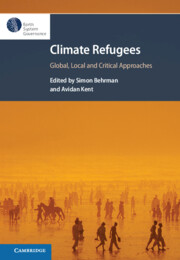Book contents
- Climate Refugees
- Series page
- Climate Refugees
- Copyright page
- Contents
- Contributors
- Acknowledgements
- 1 An Alternative Introduction: An Interview with the Editors, Which Never Took Place
- Part I Global Governance
- Part II International Law
- Part III Regional and Local Perspectives and Solutions
- 9 Climate Migration and Its Inclusion in Mexican Legal and Political Frameworks
- 10 Integrating Climate-Induced Mobility in Climate and Migration Policies in Brazil
- 11 Climate Displacement and Community-Led Solutions
- 12 ‘Climate-Displaced People’: A Small Island Developing States Perspective
- 13 Any Port in a Storm? Climate, Mobility, and Choice in Pacific Small Island Developing States
- 14 The Role of Environmental Disasters in Asylum Cases: Do German Courts Take Disasters into Account?
- 15 Building Governance Resiliency: Lessons from the United States
- Part IV Critical Approaches
- Index
13 - Any Port in a Storm? Climate, Mobility, and Choice in Pacific Small Island Developing States
from Part III - Regional and Local Perspectives and Solutions
Published online by Cambridge University Press: 01 April 2022
- Climate Refugees
- Series page
- Climate Refugees
- Copyright page
- Contents
- Contributors
- Acknowledgements
- 1 An Alternative Introduction: An Interview with the Editors, Which Never Took Place
- Part I Global Governance
- Part II International Law
- Part III Regional and Local Perspectives and Solutions
- 9 Climate Migration and Its Inclusion in Mexican Legal and Political Frameworks
- 10 Integrating Climate-Induced Mobility in Climate and Migration Policies in Brazil
- 11 Climate Displacement and Community-Led Solutions
- 12 ‘Climate-Displaced People’: A Small Island Developing States Perspective
- 13 Any Port in a Storm? Climate, Mobility, and Choice in Pacific Small Island Developing States
- 14 The Role of Environmental Disasters in Asylum Cases: Do German Courts Take Disasters into Account?
- 15 Building Governance Resiliency: Lessons from the United States
- Part IV Critical Approaches
- Index
Summary
The Pacific Small Island Developing States are low-lying and located near the equator, where changes in mean temperature, rainfall, and hazards such as floods and storms will be most severe. As developing countries, their populations are often classed as vulnerable with their ability to adapt constrained. This chapter identifies current mobility flows in Kiribati, Tuvalu, and Marshall Islands to show that movements are largely from outer islands towards urban centres which can create new risks in overcrowded, exposed towns, and cities. While flows of people into urban areas are increasing, flows out are less dynamic. People may want to move, but their agency may be limited.
The chapter then considers existing and potential frameworks and innovative ways to facilitate more adaptive and dignified forms of migration. It outlines opportunities for addressing climate-related mobility for the Pacific Small Island Developing States at the global, regional, and national level. It considers global frameworks such as the UNFCCC and then analyses the constraints to regional agreements which would enable ‘Migration with Dignity’. The chapter concludes that new efforts at all levels are essential to boost the agency of Islanders to be able to decide whether to move, and under what circumstances.
- Type
- Chapter
- Information
- Climate RefugeesGlobal, Local and Critical Approaches, pp. 249 - 260Publisher: Cambridge University PressPrint publication year: 2022
- 2
- Cited by

